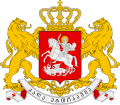You can help expand this article with text translated from the corresponding article in French. Click [show] for important translation instructions.
|
 | |
France | Georgia |
|---|---|
| Diplomatic mission | |
| Embassy of France, Tbilisi | Embassy of Georgia, Paris |
| Envoy | |
| Ambassador Olivier Courteaud | Ambassador Irakli Kurashvili |
French-Georgian relations are foreign relations between France and Georgia. Formal diplomatic relations between the two countries were first established in January 1921 but were soon interrupted by the Red Army invasion of Georgia. [1] Relations were restored on August 21, 1992 following the collapse of the Soviet Union. Both nations are members of the Council of Europe. France is a member of the European Union, which Georgia applied for in 2022.

